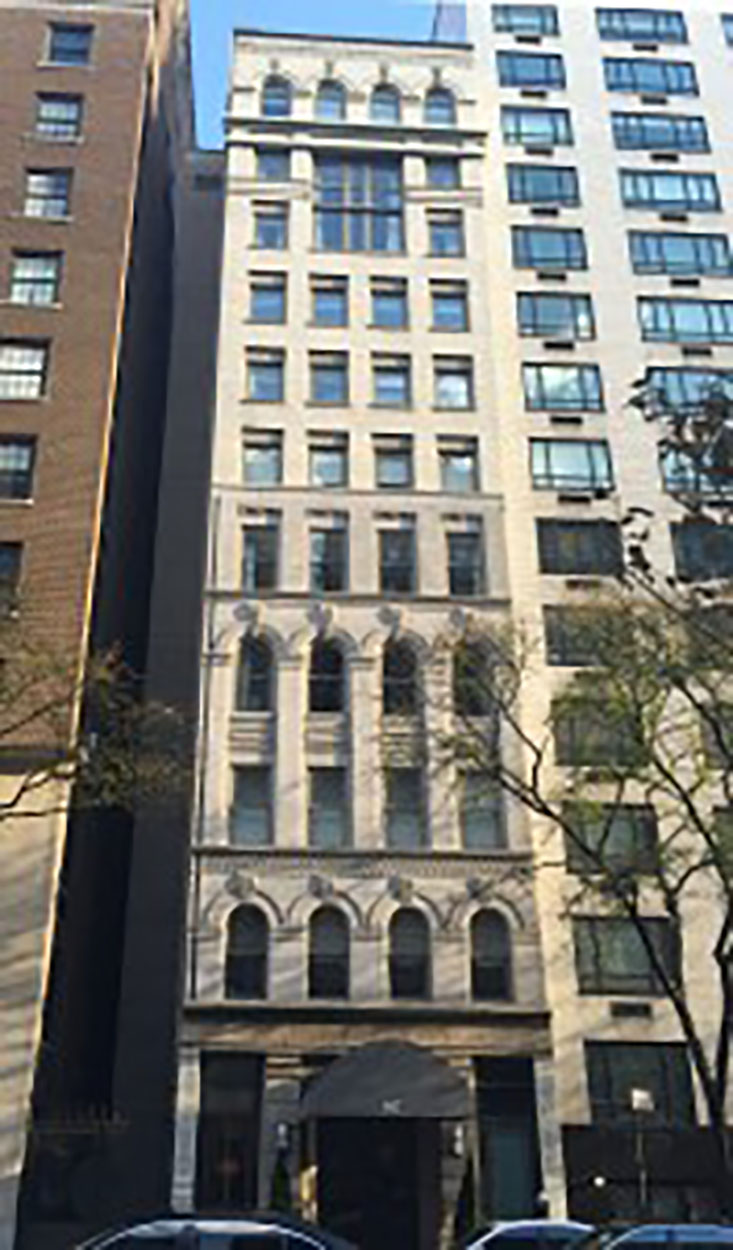Building Name
807 Park Avenue
Architect
Neville & Bagge
Year(s) Built
1898-99
Alterations
Enlarged, 1980s
Designation
Upper East Side Historic District

Project Information:
An altered apartment, originally built as a Romanesque Revival/neo-Renaissance style residence designed by Neville & Bagge in 1898-99, and enlarged in the 1980s. Application is to demolish the building and construct a new building.
CB8 Hearing: 11/17/2014 (Disapproved)
LPC Hearing: 12/02/2014 (No Action)
LPC Meeting: 02/10/15 (No Action); 03/24/15 (No Action); 06/09/15 (Approved)
FRIENDS' Testimony:
The demolition of a building in a historic district is a serious undertaking, and not to be taken lightly. The merit of the applicant's proposed design is not a matter of consideration; the question is whether the existing building should be torn down. FRIENDS feels strongly that the answer is a resounding "no."
During the discussion at our Preservation Committee, one member wondered whether the building would be listed as ‘no style’ if the designation report were written today. We easily came to the conclusion that it most certainly would not be the case. Despite the alterations made to the building and the discrepancies in the designation report, the current building has significant architectural features that contribute to the historic district. Demolition of this building would set a terrible precedent. Moreover, no adequate rationale for this application has been provided. There are a number of ways the applicant could address the interior layout without the wholesale destruction of a historic building.
The Preservation Committee at FRIENDS emphatically urges the Commission to deny the application.
FRIENDS' Testimony:
As stated in our previous testimony from December 2nd, 2014, FRIENDS maintains that ‘the demolition of a building in a historic district is a serious undertaking, and not to be taken lightly.’ We continue to advocate for the retention of the historic building at 807 Park Avenue.
Further, we are perplexed by the applicant’s refusal to address issues raised by the community and the Commission at the Public Hearing in December. The Commissioners put forth a number of concerns with the proposal, and Chair Srinivasan specifically asked the applicant, on behalf of a majority of the Commissioners, to explore ways of retaining the 5-storey historic facade. This portion of the building contains the majority of significant details listed in the designation report. With the exception of the cornice, almost all of the elements highlighted in the report remain intact.
To allow the demolition of this historic building at the whim of a developer would set a terrible precedent, and we continue to urge the Commission to reject the wholesale destruction of this historic building.
The Preservation Committee at FRIENDS emphatically urges the Commission to deny the application.
LPC Hearing:
FRIENDS' Testimony:
As stated in our previous testimony from December 2nd, 2014, and again in our follow-up letter dated February 10, 2015, FRIENDS maintains that “the demolition of a building in a historic district is a serious undertaking, and not to be taken lightly.” We remain unconvinced that there is reasonable cause to demolish the historic building at 807 Park Avenue.
It is remarkable that an applicant would repeatedly return to present the same proposal, with no effort to incorporate changes requested by the Commission. This is now the third time this proposal has been put before us, and the second time the applicant has ignored specific requests by the Commission to change it. At the Public Hearing on December 2nd and the Public Meeting on February 10, after a majority of Commissioners voiced concerns over the demolition of the historic building, Chair Srinivasan requested that the applicant explore retaining the 5-story historic base. These requests have been ignored.
The applicant now offers two reasons for this disregard. The current proposal states, “For convenience the proposed design, as presented to the Commission on December 2nd 2014, has been used, without alteration, for imposition of the fragment.” This demonstrates a half-hearted attempt to study the possible retention of the historic elements of this building. The application continues to state that, “if a successful arrangement were in fact possible, a new façade design, incorporating the fragment, would be required to properly express a satisfactory architectural design as well as the appropriate characteristics of the historic district.” Is that not exactly what the Commission and the public have repeatedly asked for?
The second justification is that, “in a period of over 30 years and two major alterations, valued at millions of dollars, the superimposition of this 1899 tenement type façade on a Park Avenue type apartment building simply hasn’t worked.” To illustrate this point, the proposal includes a wonky section and photos of awkwardly-placed windows. Instead, these photos actually show that this building did work until the current owner divided the floors to add a duplex apartment. There is no evidence that the façade is to blame for any financial hardship at this building -- and if the owner would like to make that claim they are welcome to file a proper hardship application.
To demolish this building to mitigate for the miscalculations of an owner would set a terrible precedent. The Preservation Committee at FRIENDS emphatically urges the Commission to deny the application.
LPC Hearing:
FRIENDS' Testimony:
FRIENDS is grateful to the Commission for its steadfast commitment to the original five-story tenement building at 807 Park Avenue. And so we were pleased to see that the applicant has finally begun to explore ways to retain the historic fabric in this most recent iteration. However, the proposal needs to be refined further. The addition must either compliment its lower stories, or create a dynamic contrast. The current design does neither.
The Preservation Committee at FRIENDS requests the Commission work with the applicant to achieve a more appropriate design.

